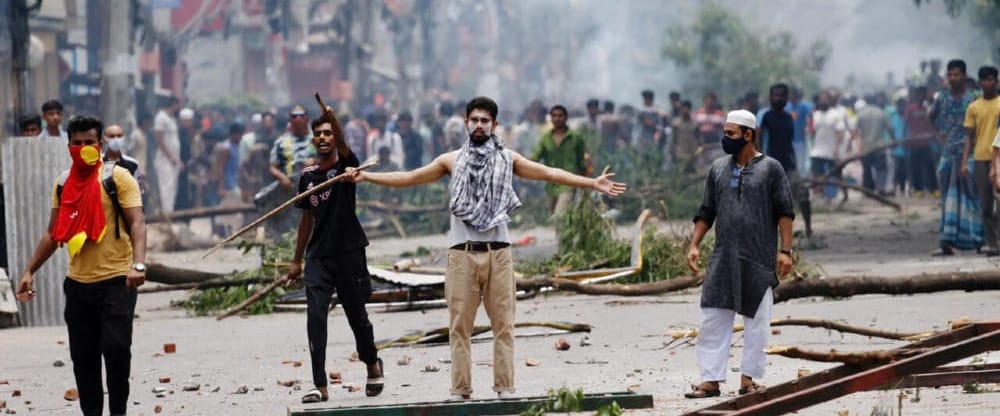Violent Protests Grip Bangladesh as Students Demand Reform
Bangladesh is in turmoil as student-led protests continue to escalate, despite universities agreeing to shut their doors indefinitely.
Bangladesh is in turmoil as student-led protests continue to escalate, despite universities agreeing to shut their doors indefinitely. The move was aimed at calming the unrest, but it has instead fueled further anger and violence, particularly in Dhaka, where six people have already lost their lives.
The catalyst for the protests is the contentious quota system, which reserves a significant portion of public sector jobs for the relatives of war veterans, women, people with disabilities, disadvantaged district residents, and indigenous communities. Initially introduced in 1972 by Sheikh Mujibur Rahman, the father of current Prime Minister Sheikh Hasina, the system was intended to support those who contributed to Bangladesh's independence from Pakistan. However, critics argue that it now serves as a tool for political gain by the ruling Awami League.
The situation turned particularly dire in Dhaka, where the sadness over the deaths of fellow students quickly morphed into anger and violence. Students attempting to mourn their dead classmates were forcibly dispersed by police, who used sound grenades, homemade explosives, and tear gas. "We were returning after the funeral when they attacked us," said one protester. "How will the protests remain peaceful if the administration doesn't want to cooperate?"
Despite the government's order to close all schools and universities indefinitely, the protests show no signs of abating. Prime Minister Sheikh Hasina has vowed that those responsible for the violence, looting, and murders—regardless of their political affiliation—will be held accountable. "I firmly declare that those who carried out these acts will face appropriate punishment," she stated.
Amnesty International has authenticated and analyzed eyewitness accounts, videos, and photographic evidence that confirm the unlawful use of force by police. Witnesses report that the Bangladesh Chhatra League (BCL), a student body affiliated with the government, has been particularly violent. BCL members, armed with rods, sticks, clubs, and even revolvers, have reportedly attacked students indiscriminately.
Mamud, one of the main organizers of the protests, provided a harrowing account: "Bangladesh's government has used its agitators and security forces to attack our peaceful demonstrations. So far, we've been told of ten deaths. Even as I record this, bullets are being fired at protesting students."
The Supreme Court had previously suspended a court order that reinstated the quota system, but students remain skeptical of the government's intentions. They argue that the government, led by Sheikh Hasina, benefits politically from maintaining the quota system and will find ways to keep it in place.
Interestingly, many of the protesting students are women, despite the quota system providing benefits to women. They argue that they do not need these quotas and see the system as fundamentally unfair.
The protests, initially peaceful, turned violent after Sheikh Hasina referred to the protesters as "razakar," a derogatory term used to describe collaborators with Pakistan during the 1971 war. This comment incensed the students and is believed to have exacerbated the violence.
As the situation remains tense, international bodies and human rights organizations, including the United Nations, have urged Bangladesh to protect peaceful protesters from all acts of violence and the deadly use of force.
Bangladesh is at a critical juncture, with student protests highlighting deep-seated grievances over employment and fairness in public sector job allocations. As the government and protesters remain at an impasse, the future of the nation's youth and its political landscape hang in the balance.






